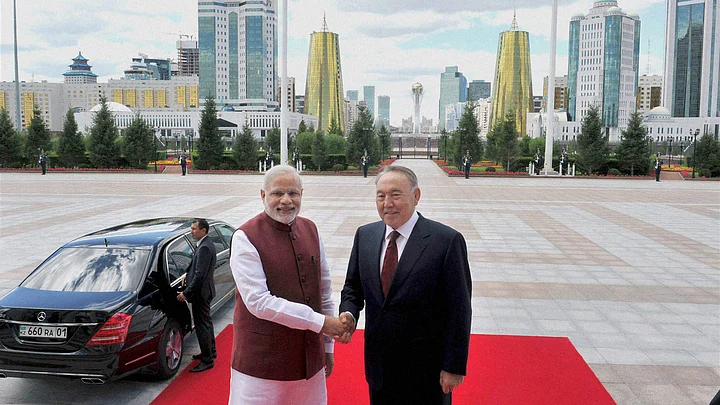India’s quest for sourcing energy from Kazakhstan has been as old as modern Indo-Kazakh relations. In fact, general expectation still remains high and one hopes that Prime Minister Narendra Modi’s recent visit to Astana strengthens energy cooperation.
The deal inked between the two countries on uranium supply is certainly a ray of hope. So far, only uranium trade has proved to be the most promising deal with Kazakhstan. Kazakhstan which has rich reserves of uranium has agreed to supply 5000 tonnes of uranium during 2015-19.
The deal is a major victory and this could boost Modi’s clean energy plans. But there is no case for India to be euphoric on this front.
Growing energy needs of India
Unlike Australia and Japan that insisted on India signing the nuclear nonproliferation treaty (NPT), Kazakhstan never restrained itself from having nuclear ties with India. It was among the first few countries to support India at the International Atomic Energy Agency (IAEA) and the Nuclear Suppliers Group (NSG) meet in 2009.
India’s uranium fuel needs are growing. A deal with Kazakhstan is attractive in terms of both fuel supply and setting up small and medium nuclear reactors.
So far, India’s nuclear ties with Kazakhstan are modest and as such they do not raise many eyebrows. However, if the ties intensify, there would be possible pressure coming from both Russia and China.
Geopolitics of oil exploration
On oil exploration, India never gave up its hope on Kazakhstan. After negotiating back and forth for several years, the ONGC Videsh (OVL) – Mittal combine was assured in 2005 of a $4.18 billion stake in an oil field owned by PetroKazakhstan. Kazakhstan later maneuvered the deal in favour of China. It had allowed China’s CNPC to revive its bid to beat OVL for the same deal.
However, India did not give up. In 2009, India decided to woo President Nazarbayev diplomatically and invited him to be the Chief Guest on India’s 60th Republic Day celebrations that year. But in 2013, he again gave India a raw deal and went back on a promise to give OVL 8.4 per cent stake in the Kashagan field from the US giant ConocoPhillips. Nazarbayev is known to be a sly fox.
He likes fiddling around with the equation of geopolitics. Outwardly Russia’s ally, he plays a delicate balancing game of engaging various suitors in the ongoing competition for energy. Nazarbayev tried pulling India into a delicate game with China. He made a commitment for Indian oil explorations several times but dragged his feet later. There have been other instances of business irregularities as well which had scared Indian investors moving into the Kazakh market.
They had caused disappointment - dampened enthusiasm in India for closer relations with Central Asia. Many however argued that it was New Delhi’s benign indifference that prompted Nazarbayev against energy deals. There is no doubt that the Kazakhs consider India to be a reliable and predictable partner but at the same time they do not consider India to be a good performer.
Why India cannot ignore Kazakhstan
Indian investors also have their limitations. They do not have deep pockets, do not take business risks and do not understand Central Asians at all. They are often scared of the devious political, legal and tax regimes practiced there. Then there is the language barrier. Visa regimes for Indian visitors are extremely tight in these countries.
Yet, India cannot afford to ignore Kazakhstan. Its oil reserves are 30 billion barrels and projected to touch 100-110 billion barrels by 2015. The current annual production of 100 million tons (1.7 million barrels per day) would jump to 150 million tonnes by 2015. Future production is linked to the development of the giant Tengiz, Karachaganak and its offshore Kashagan fields. Kazakh natural gas production is projected at 5 trillion cubic meters by 2015. The country has 31.8 billion tons of proven coal reserves as well.
All these offer alluring possibilities of meeting India’s thirst for energy. However, in reality, India’s energy ties with Kazakhstan are going to be symbolic at the most. The Kazakhs certainly espouse the idea of engaging India for countervailing the Chinese, but they know well that it is only China which can fit the bill ultimately.
For India, the problem has never been about sourcing the energy but the challenge of getting energy to India. And this is less to do with distance but more with the geopolitical isolation of India. Here, India is a victim, perhaps of its own choosing, of a bigger strategic denial game.
The outlets of Central Asian energy flow would continue to remain either northward or eastward. For them connecting with the south is a huge mental block. Any reorientation and shift of direction would require more than Indian efforts. Afghanistan and Pakistan with their own problems explains the apprehension of Central Asia.
This is not to suggest that India will have no stakes in energy opportunities in Central Asia. India could invest in international energy consortiums. Not just that, Central Asia and the Caspian region could become another Middle East for the Indian engineers, management experts and workers to find jobs in the oil industry. India should find other innovative ways to engage itself in Kazakhstan’s energy sector.
(The author is a former Ambassador.)
